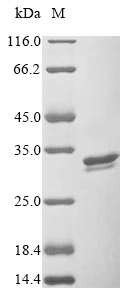The gene responsible for the Staphylococcus aureus entA protein (25-257aa) is cloned into a plasmid vector to obtain recombinant plasmid, which is then transformed into baculovirus cells. baculovirus cells demonstrating successful uptake of the recombinant plasmid are selected based on their ability to endure a specific antibiotic. The baculovirus cells containing the recombinant plasmid are cultured under conditions promoting the expression of the gene of interest. The protein carries a N-terminal 10xHis tag and C-terminal Myc tag. Post-expression, affinity purification is employed to isolate and purify the recombinant Staphylococcus aureus entA protein from the cell lysate. The resulting recombinant protein is subjected to denaturing SDS-PAGE, allowing for an estimation of its purity, surpassing 90%.






